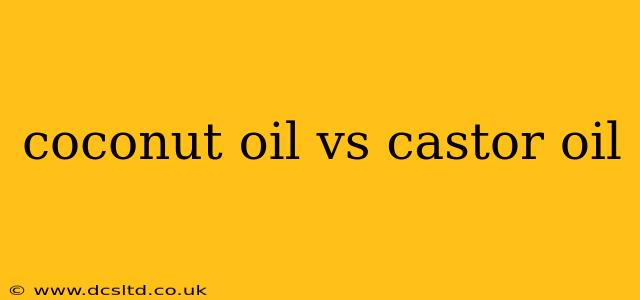Choosing between coconut oil and castor oil can feel overwhelming, given their overlapping uses and purported benefits. Both are natural oils with a long history of use in beauty and wellness routines, but their properties differ significantly, leading to distinct applications. This in-depth comparison will explore their individual strengths and weaknesses, helping you decide which oil best suits your needs.
What are the key differences between coconut oil and castor oil?
The core difference lies in their fatty acid composition. Coconut oil is predominantly composed of medium-chain triglycerides (MCTs), particularly lauric acid, known for its antimicrobial properties. Castor oil, on the other hand, is primarily composed of ricinoleic acid, a unique fatty acid with potent anti-inflammatory and moisturizing effects. This difference in chemical makeup dictates their distinct applications and benefits.
What are the benefits of coconut oil for hair?
Coconut oil's medium-chain triglycerides penetrate the hair shaft effectively, reducing protein loss and improving hair's overall strength and shine. Many find it beneficial for moisturizing dry, damaged hair, and protecting it from heat styling damage. However, its effectiveness varies depending on hair type and porosity. Those with fine or oily hair might find it too heavy, leading to build-up.
What are the benefits of castor oil for hair growth?
Castor oil is frequently lauded for its potential to stimulate hair growth. Ricinoleic acid, its main component, is believed to improve blood circulation in the scalp, potentially nourishing hair follicles and promoting growth. Its thick consistency also creates a protective barrier, minimizing breakage and promoting stronger, healthier hair. While anecdotal evidence abounds, more rigorous scientific research is needed to definitively confirm these growth-promoting claims.
Does castor oil really promote hair growth?
While castor oil's potential to promote hair growth is widely discussed, scientific evidence remains limited. Many users report positive experiences, attributing improved hair growth to increased scalp circulation and reduced breakage. However, more robust clinical trials are needed to establish a direct causal link between castor oil application and accelerated hair growth. The improvements seen are likely a combination of better scalp health and reduced breakage, rather than solely accelerated hair follicle activity.
What are the benefits of coconut oil for skin?
Coconut oil's antimicrobial properties make it suitable for treating minor skin irritations and infections. Its moisturizing properties can soothe dry skin, while its antioxidant content may help protect against sun damage. However, its comedogenic nature (potential to clog pores) means it may not be suitable for those with acne-prone skin.
What are the benefits of castor oil for skin?
Castor oil's rich, emollient properties make it an effective moisturizer for dry, irritated skin. Its anti-inflammatory properties may help soothe conditions like eczema and psoriasis. Like coconut oil, castor oil is comedogenic, so caution is advised for individuals with acne. It's often used in the treatment of certain skin conditions due to its ability to improve skin barrier function.
Can castor oil be used as a moisturizer?
Yes, castor oil can be a highly effective moisturizer, particularly for dry and irritated skin. Its thick consistency creates a protective barrier, locking in moisture and preventing further water loss. However, its comedogenic nature means it shouldn't be the sole moisturizer for those with acne-prone skin; it might be better suited as a spot treatment or combined with other lighter moisturizers.
Which oil is better for hair?
The "better" oil depends entirely on your hair type and concerns. Coconut oil is a good choice for moisturizing dry, damaged hair, but those with fine or oily hair might find it too heavy. Castor oil, with its potential to stimulate growth and reduce breakage, may be better for those seeking to improve hair health and promote growth, though its effects need more research.
Which oil is better for skin?
Similarly, the ideal choice depends on your skin type and concerns. Coconut oil works well as a moisturizer for dry skin but may not be suitable for acne-prone skin. Castor oil offers similar moisturizing benefits and potential anti-inflammatory effects but shares the same potential for clogging pores. Both should be used cautiously and in moderation.
This comprehensive guide aims to illuminate the key distinctions between coconut oil and castor oil, equipping you to make informed decisions based on your individual needs. Remember, individual results may vary, and it's always wise to conduct a patch test before applying either oil extensively.
